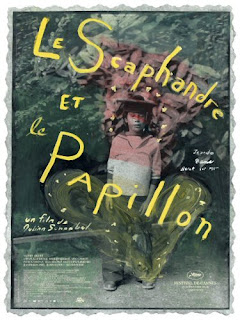 You might think that a film about man who suffers a stroke and is forced to live out his life, unable to move, even unable to speak, would be depressing. That's what I figured going in to The Diving Bell and the Butterfly. I knew what it was about, but wanted to see it because it had been getting rave reviews and my wife, a lover of everything French, and I needed a night out together. The film begins with sadness, but after it's over you feel full of life, ready to face the world in a whole new light.
You might think that a film about man who suffers a stroke and is forced to live out his life, unable to move, even unable to speak, would be depressing. That's what I figured going in to The Diving Bell and the Butterfly. I knew what it was about, but wanted to see it because it had been getting rave reviews and my wife, a lover of everything French, and I needed a night out together. The film begins with sadness, but after it's over you feel full of life, ready to face the world in a whole new light.
Right from the start, the film puts you into Jean-Dominique Bauby's head, the first scene is filmed completely from his perspective. You wake up in a hospital, you don't quite know what's going on. Your eyes won't focus, doctors and nurses stream in and out of the room, and when you talk to them, they don't hear you. They tell you that you've suffered a stroke, that they're not quite certain of the damage yet. But it is soon quite apparent that it is catastrophic; you have what they call "locked-in syndrome". Information comes in through your senses, but you are unable to communicate with the outside world.
Your eye is going septic, you watch as they sow it shut; an incredible scene. The only thing you can think about is dying. Because what good is life, if you can not travel through it, are only able to see it through one pathetic eye, and unable to tell anyone what you are feeling. What good could possibly come of it? The film does an impeccable job of putting you into Bauby's state-of-mind, gives you a slight feeling for what he must have gone through. You're left feeling hopeless as he is; but then it all begins to lighten up. Bauby meets a beautiful nurse who teaches him how to speak by blinking his eye. It's an incredibly torturous way to communicate, but when it's your only choice, you must make do.
That's the power of The Diving Bell and The Butterfly. That it makes you appreciate life, even from the perspective of someone who is almost completely unable to do so. He makes new friends, connects with his family and father in a way that he couldn't before, and learns more about who he is than anyone could probably imagine. If you're stuck in your head 24/7, than you fill your life with memories, good and bad; relive your childhood, correct mistakes, and become a better person. He has so much wanting to get out, that he decides to write an auto-biography, which he must do one slow letter at a time.
Director Julian Schnabel has crafted a true masterpiece out of real-life; gorgeously photographed, full of wonderful sights and sounds, and completely heart-warming, without ever being preachy or schmaltzy. I haven't seen a lot of them, but I imagine this will remain my favorite foreign film of 2007. It was a crime, that it was denied a slot in the Academy Awards Best Foreign Language; in all honesty it should have been up for Best Picture over the cutesy Juno. (But they needed at least one popular film in there.) Do yourself a favor and see this film when it's released on DVD, you'll be glad you did. - Grade: A







I just read this book last week, and it was so hopeful and tragic and beautiful...sigh.
Great review